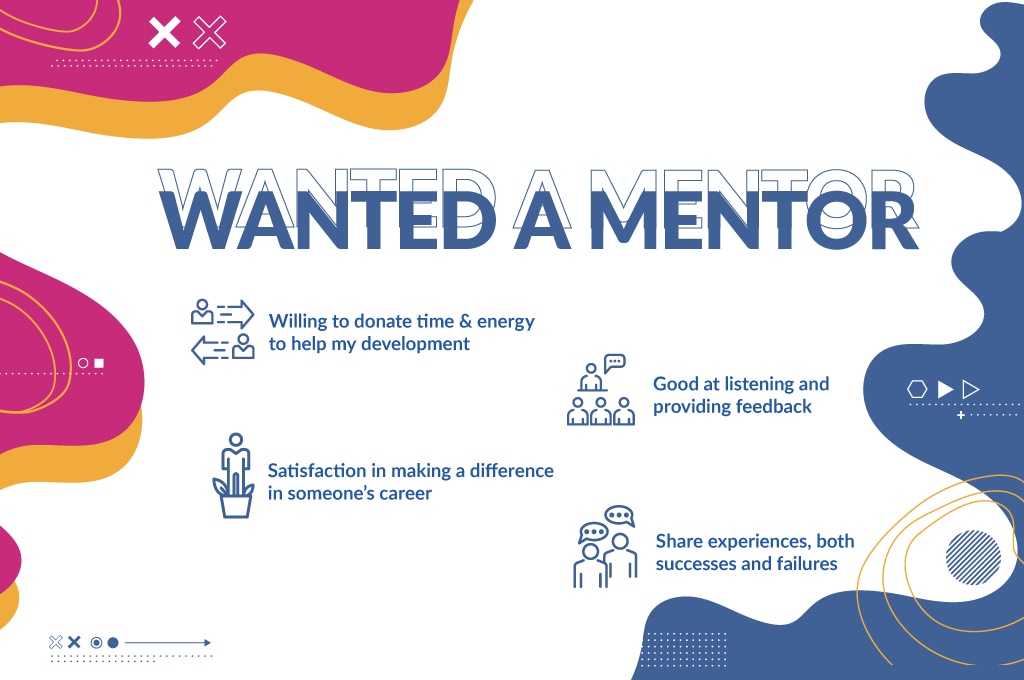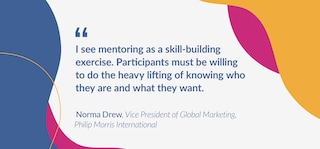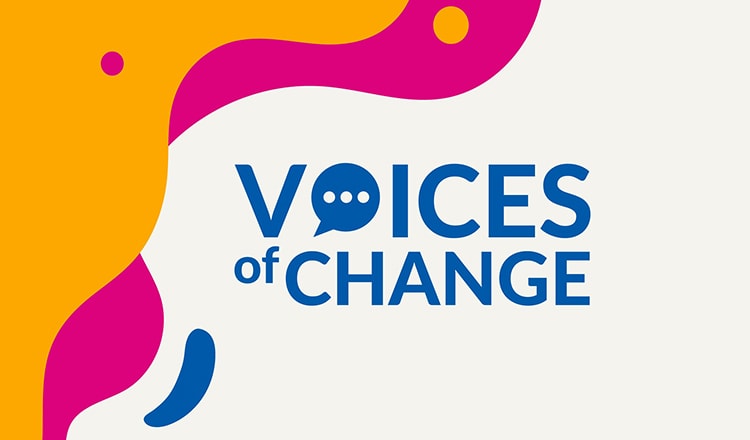I’m often asked to be a mentor at Philip Morris International (PMI), mostly by female colleagues who reach out for counsel on their careers.
I always try to accept these requests, because I know it’s not easy to seek help, but occasionally I must regretfully decline.
Why? Because I’m already juggling several mentoring relationships with my schedule. And because I might not be the best fit for that particular individual. There are a number of factors you should take into account when choosing the right mentor.
Here are four tips on finding the mentor best suited to your needs:
1. Look for experience you’ve not yet had: Ideally, your perfect mentor is someone who has a broader perspective than you. This doesn’t mean they must be senior to you—only that they have had experiences that might benefit you. Research colleagues on LinkedIn to learn about their work experiences—or make connections in your company’s (virtual) hallways with newcomers to the organization who may have experiences that would benefit your development.
2. Embrace diversity: Mentors don’t have to “look like you” to be helpful. They don’t have to be the same gender, ethnicity, nationality, or any other “descriptors” to form a great working mentorship. Often, there’s a rich, diverse supply of learning to tap into from people of different backgrounds.
3. Consider formal and informal mentoring: I’ve done both. I’ve been assigned to be a mentor for people I didn’t know and I’ve had organic mentoring relationships develop through work. Experience has taught me that chemistry matters in a mentoring relationship, so I’ve often found informal is better. But both types can work—it depends on the people involved and if both are committed to the mentoring process.
4. Form a mentoring “team”: Think about having mentors for different areas of skill development. That way, you can benefit from many perspectives—and broaden your own.
Photo posed by models. © Getty Images.
I see mentoring as a skill-building exercise. Participants must be willing to do the heavy lifting of knowing who they are and what they want.I remember hearing a quote that resonated with me: “The second hardest thing in life is to figure out what you want. The hardest thing is to say it out loud.”
A good mentoring relationship—which requires chemistry and compatibility—can help close the gap between what you have and what you want.
It’s important to note that mentoring is not the same as sponsorship. Sometimes, when people ask me to be a mentor, what they’re really after is a sponsor.
Sponsorship is when someone knows your work and can advocate for you. Mentorship, on the other hand, helps you develop. Both have a role to play in your career, but it’s important not to confuse the two.
So, how do you optimize the time with your mentor?
How to make the most out of a mentoring relationship:
1. Come prepared: You need to take responsibility for booking time and coming prepared. It’s not just a chance to chat. I’ll be prepared as well.
2. Set goals: You must have precise goals to discuss—a particularly thorny business challenge or an ambiguous strategic issue are always good places to start. However, I find most female mentees want to discuss softer skills—how to advance their careers, how to exhibit leadership skills, how to be heard in meetings. These are great topics too.
3. Keep it confidential: Mentoring is built on trust. If I share a personal story, I trust you to keep it between the two of us.
4. Expect homework: I’ll give you an assignment for our next meeting.
5. Be ready for a beginning and an end: We’ll work together for six to 12 months and then assess where we are. Mentoring isn’t meant to be open-ended.
6. Remember it’s reciprocal: I appreciate learning from the people I mentor, and often ask my mentees to share articles or information on their area of expertise. I’ve had great conversations about topics I know little about. It’s a win-win.
For mentees, a beneficial mentoring relationship shouldn’t be predicated on praise for the good work you’re contributing to your organization. It’s also about seeking the guidance and experience of your mentor to build on your strengths and address potential blind spots.
That’s why arriving with two areas you’re acing and two more that need improvement will ensure that you’re not just getting flattering feedback.
Make sure you’re having conversations on hard as well as soft business skills, like how to drive sales, improve Net Promoter Score, or increase margins.
After all, there are only two ways to improve business performance—increasing sales or decreasing costs. Every employee can add value by addressing at least one of these topics.
Photo © Norma Drew.
Women shouldn’t just take the positives
Research from Lean In and McKinsey in 2016 found that women are just as likely to ask for feedback as their male colleagues—but are 20 percent less likely to get it.
The report found that: “Most managers say they rarely hesitate to give difficult feedback to both women and men, but women report they receive it less frequently. This may be driven by differences in how feedback is delivered: managers who hesitate to give difficult feedback are more concerned about triggering an emotional response from women.”
I have witnessed this disparity myself. I once had a male manager confide to me that he wasn’t as comfortable sharing negative feedback with women as he was with men.
That can be a major invisible disadvantage for women, so ensure you’re asking your manager point-blank for feedback on both hard and soft skills.
Don’t skip happily out of the room after hearing only the positives. Turn around, go back in, and ask directly for feedback on blind spots or areas where you’re underperforming. You can’t fix it if you don’t know it’s a problem.
Keep learning to keep progressing
I’ve had a few mentors who have made a significant difference to my career. Writing this article has been a good reminder for me to reach out and thank them once again.
None of us get here by ourselves—parents, teachers, colleagues, bosses, and mentors all contribute to our success.So, don’t stand back if you feel a mentor would enrich your career prospects. Take the time to look around you for a good fit, discover who might be willing to help, work up the courage, and ask.
The results could pay dividends—both for you and your company.
* Norma Drew retired from PMI in April 2022.










